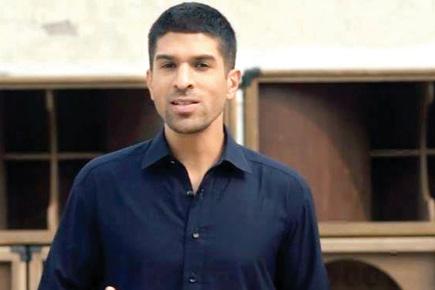The Ska Vengers' Taru Dalmia is trying to crowdfund a wooden sound system that can travel around the country with him

Taru Dalmia
ADVERTISEMENT
"Music has the potential to unite people from varied backgrounds and cut across class barriers," says Taru Dalmia, also known as reggae artist Delhi Sultanate and the lead singer of ska band The Ska Vengers. It's this thought that has made him start the Reggae Sound System project. The idea is to build a travelling sound system that can be put up anywhere, so that music can be heard and felt — thanks to the bass-heavy music — as an open community.

Taru Dalmia started building his sound system 6 months and has, until now, collected $19,000 for its completion
A sound system Dalmia explains, is a fixed stack of hand-built wooden speakers. It usually weighs 90 kilos and is over a metre long. What makes it mobile is that it can be transported in a van. As he says, most sound systems are expensive and hence, that affects where the music is heard and by whom. His crowd funding project, that started two months ago has helped him raise $19,000, which is $3000 more than he expected. The sound system took six months to make. "I am, in part, inspired by dances or sessions held in ghetto areas in Kingston, Jamaica, such as Rae Town or Passa Passa. These are ghetto or garrison areas, but people from uptown may venture in, just to listen to the music — one of the only times this would happen," he says. "We will start with low-key areas in Delhi like a haveli in Chandni Chowk. For example in Hyderabad last year, I met people from a Dalit organisation who wanted to help organise events and I think Dalits will engage with reggae, as their cause is much like the Black cause."
But he knows that a multiple set of challenges await him. For example, he needs to learn how to operate the system once it's ready. Since he has always just been involved with the performance bit, he will now need to learn the nitty gritties of sound engineering. "I am getting a team of audio engineers to help." He also calls it a "weapon". "Noise regulations will be a problem. Cops are never far from cultural activity, especially one that makes noise," he says. "In the past, I have had only good experiences setting up sound and playing in public spaces. For example, we once played at a protest, which was a counter to one of PM Modi's pre-election rally, at Jantar Mantar. The opposing faction, which was right wing, would make noise at every event. However, the day we played, the kids from there came over to listen."
One of the interesting things about the project is the kind of music that the sound system will play — bass heavy reggae. It's Dalmia's belief that since the bass is felt in our bodies, it will act as an agent of change.
"Bass deals with deep frequencies, which resonate and create an impassioned visceral response in humans. It's a sound we can not only hear, but feel, literally. Bass frequencies are the earliest sounds perceived by humans. Once a foetus's hearing is formed, the first frequencies it begins to hear and sense are low frequencies like the mother's heartbeat."
Why it's reggae is because as Dalmia says, Jamaica and India have a shared history of oppression and cultural resistance. And also, reggae music in particular, has always been known to be uplifting and fostering unity. "Reggae in many ways is much closer to our social experience than other musical imports from Europe or America," he says, "In 2012, The Ska Vengers played at an event to commemorate the victims of the 2002 Gujarat pogrom against Muslims. Many victims and relatives had come down. The response was overwhelmingly positive. If people get the sense that you are playing for them and are not out to make money then they will show you love."
 Subscribe today by clicking the link and stay updated with the latest news!" Click here!
Subscribe today by clicking the link and stay updated with the latest news!" Click here!








